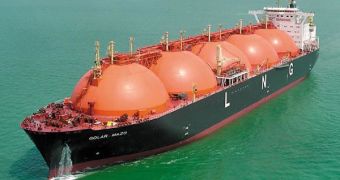Despite its having a fairly long relationship with petroleum-based fuels, the marine shipping industry appears willing to get on with its life, and has taken a keen interest in switching to liquefied natural gas, more commonly known as LNG.
Thus, specialists expect that, by the year 2020, the global fleet of ships that run on this energy source will increase 42 times, and come to encompass roughly 1,800 vessels.
The Energy Collective details that this increase in the number of LNG-powered vessels has been documented in comparison with how many such ships are currently in use.
Specifically, it would appear that, presently, the marine shipping industry has 42 LNG-powered ships to parade around, should it choose to do so.
By the end of the year 2014, this number if expected to double, and, in just a few years afterwards, LNG stands to become a favorite.
The same source explains that, as surprising as this may sound, the marine shipping industry is very likely to soon start relying heavily on LNG not just due to financial considerations, but also because of environmental ones.
To put it in a nutshell, specialists say that said energy source has new emission standards to thank for the increase in its popularity.
The standards in question are bound to come into effect in 2015, and target marine traffic in North America, the US Caribbean, and European waters.
Among other things, they stipulate that fuel sulfur content must be reduced from 1.0% to 0.1%.
In order to abide by these new standards concerning the ecological footprint of the marine shipping industry, vessels would either have to switch to using low-sulfur diesel, install exhaust scrubbers, or opt for LNG.
Since low-sulfur diesel is rather difficult to come by and fairly expensive, as are the scrubbers that ships would be required to install, it is no wonder that most vessels will choose the third alternative.
This is because, when compared to the other two possibilities, LNG does not come with an impressive price tag, and also performs quite well.

 14 DAY TRIAL //
14 DAY TRIAL //